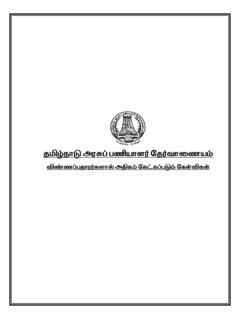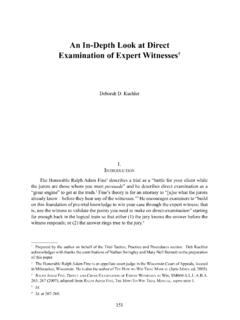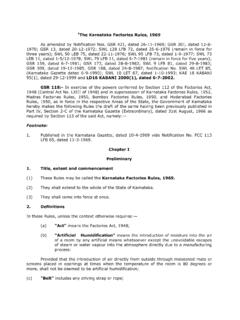Transcription of CUSTODY LITIGATION: DISCOVERY, EXPERTS, EVIDENCE, …
1 CUSTODY litigation : discovery , EXPERTS, evidence , TRIAL PROBLEMS, ETC. 1. INTRODUCTION. CUSTODY battles involve the most emotionally, financially, and physically taxing areas of family law litigation . The key to prevailing in a CUSTODY case is thorough preparation from the very inception of the case. From the moment the client is interviewed, the practitioner should begin to develop possible themes and theories of the case. The unique nature of each CUSTODY case requires the practitioner to develop a different strategy and approach for every client. Additionally, the dynamic character of CUSTODY litigation demands a strategy and approach that is adaptable to facts that are constantly changing and developing throughout the representation. While it was impossible to cover every topic, this article addresses the major areas of CUSTODY litigation , from the client interview to the actual trial. Because of the dynamic nature of CUSTODY litigation , each suggestion in this article is intended to be modified or expanded depending on the particular facts of your case.
2 A particularly hot trend in CUSTODY litigation is the issue of domicile relocation. In this situation, the interests of the parent with primary possession who wishes to move away with the child are pitted against the other parent who wishes to maximize possession of and access to a child. An attorney needs to be aware of a possible relocation issue within a CUSTODY case from the initial client interview throughout the litigation process. See attached addendum, Webb, Ackels, Burton, and Norman Relocation: Should I Stay or Can I Go?, AFLC Aug. 21 - 24, 2000, San Antonio, Texas 2. discovery . a. Client Interview CUSTODY litigation is perhaps the most emotional and most expensive type of litigation . You should advise a client seeking CUSTODY of all the potential costs associated with a CUSTODY suit. The lawyer should also ascertain important information from the client. Some of the key topics which should be covered in every client interview are discussed below.
3 I. HISTORY OF THE CASE. A client questionnaire is probably the easiest method to obtain the basic information regarding the parties. If possible, the client should fill out the client questionnaire prior to the interview. A completed client questionnaire will enable the lawyer to pinpoint key issues in a quick and efficient manner. Once the interview begins, a client is more than willing to tell you all the reasons he or she would make the better parent, and is also happy to point out the other parent's bad points. Clients may, however, try to hide the bad facts of their case out of fear of having the lawyer reject them or from general embarrassment. You must warn a client of the ill effects of surprise evidence and stress the importance of honesty. A good question to ask your client is "what is the worst thing that your spouse might say about you?". Your client needs to understand that to win the case, you need to know what evidence their spouse has against them and what positions they are going to take.
4 Once the client understands that disclosure of "bad facts" is essential to their case, the client is usually willing to provide the information you need. ii. CLIENT'S MOTIVATION. 1. The reasons why your client wants CUSTODY is really the theory of your case. Your client's motivation for seeking CUSTODY will also help you to determine how serious he or she is about going to trial and whether or not any possibility of settlement exists. You should also ask your client why he or she believes that his or her spouse is seeking CUSTODY . If at the end of the client interview you are able to understand why the parties are each willing to endure the time and expense of a CUSTODY fight, you will probably also have a good understanding of the strengths and weaknesses of your case. iii. EXPECTATIONS. You need to know what your client expects from you and then explain how feasible it is to achieve those expectations. Be open and honest with a client so that he or she understands the risks involved in CUSTODY litigation .
5 The client needs to understand your limitations and not hold an unrealistic picture in his or her mind of the potential outcome. Explain to your client the expenses involved in litigation . The client needs to know up front that CUSTODY litigation is extremely expensive and be willing to make the financial sacrifice. At this point you should explain the possible necessity of investigators, mental health professionals, ad litems and depositions. If the client cannot afford your services, you should be honest and offer alternatives. It is a bad idea to take the case on an expectation of getting paid by the other side. Outline for your client the steps of the litigation process. Even though you will likely have to explain it again, you should review service of process, temporary hearings, discovery , masters, ad litems, investigators, the trial and post trial. The client should also understand that friends, relatives, neighbors, teachers, mental health care providers and confidants may all be subject to depositions and investigations by the other side.
6 Iv. WITNESSES. The client questionnaire which you give to your client should ask for the names, addresses, and telephone numbers of people who will be good witnesses. You may interview these witnesses by mail, telephone or in person. Depending on your time constraints, you may want to have your client give each of his or her potential witnesses a questionnaire to fill out and return directly to your office. From these responses you can determine what witnesses you may want to use at the hearing and then call them with any additional questions you might have. If you intend to initially contact the witnesses by telephone, have your client talk to them ahead of time so that they will be expecting your call. Witnesses are generally more willing to provide the information you need when the questions are expected. Frequently, a potential witness who knows all the parties concerned will want to stay out of the litigation and not testify. Make sure that the persons calling the witnesses are courteous and understanding.
7 A personal interview at the reluctant witness' home will sometimes persuade him or her to come forward. If the witness is still unwilling, you and your client need to discuss how important this witness is to your case and whether or not you really want to issue a subpoena. After interviewing witnesses by mail and/or telephone, you should interview them in person whenever possible. Someone may sound like your star witness over the telephone, but may be very offensive in person. You will want to prepare your witnesses for the hearing in terms of what information they have that is important to your case and also potential areas of cross-examination. The witnesses should also understand that discussing his or her testimony with you prior to trial is acceptable and they should not be afraid to admit it on the witness stand. If the witness is not so warned, they may answer the common question: "You talked to Mrs. Jones lawyer before testifying today, didn't you?
8 " with a "No". Additional questioning will later reveal that he or she did talk to you and the witness' credibility will be tarnished. 2. b. discovery i. 1ST STEP: REQUEST FOR DISCLOSURE, INTERROGATORIES &. PRODUCTION REQUESTS. You should send Request for Disclosures pursuant to the 1999 Texas Rules of Civil Procedure (hereafter TRCP ). Specifically, TRCP 194 and its subparts provide all of the information you may need to know for sending out the Requests, and for responding to them. A good time to send out the Requests is after the Temporary Hearing and/or the Temporary Orders are in place. Interrogatories and a Request for Production should be sent out to the other side as soon as possible thereafter. Note, however that the TRCP do not require the above mentioned forms of discovery to be sent out in any particular order. In fact, TRCP lists the various forms of discovery and TRCP. states that the forms of discovery may be combined in the same document and may be taken in any order or sequence.
9 You should be familiar with all of the rules, but pay close attention to TRCP. , which covers the scope of discovery . Because opposing counsel will frequently send the identical discovery requests back to you, you may want your client to look over the Interrogatories and Request for Production to see if anything is included that they would not want to answer. For example, if your client has a girlfriend of boyfriend and does not suspect that their spouse has one then you are probably better off omitting that question. Some basic requests that you will always want to ask are: 1. Any photographs, tape or electronic recordings, and/or video recordings portraying the likeness of Respondent, Petitioner or the children. 2. Any correspondence or other written memoranda between you and your spouse for the last year. 3. Any calendars, diaries or other written logs of (Petitioner or Respondent) made in connection with this action. Once you obtain the answers to your Interrogatories and Request for Production, you should interview all witnesses to determine what knowledge they have regarding your case.
10 This will help you determine which witnesses to depose. ii. DEPOSITIONS: Depositions are governed by TRCP 195, 199, 200, 201, 202, and 203. (1) Who to Depose (a) Opposing Party Always depose the opposing party thoroughly so that you will know his or her demeanor, personal knowledge and contentions. No substitute exists for personal knowledge of the party's mode of responding to questions. If the party is extremely hostile, non-committal or uncooperative during the deposition and changes his or her demeanor in trial, the video deposition can be played for the jury to reveal Mom's or Dad's "true colors" before their lawyer prepared them for trial testimony. (b) Adverse Witnesses If unfavorable witnesses exist in the opposition's case who have 3. incriminating evidence against your client and whose presence and evidence is known to the opposition they must be deposed. Obtaining such evidence prior to trial will allow you to effectively plan a strategy to either exclude the evidence altogether or overcome its damaging effect.



